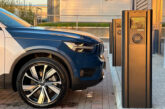
With grants and incentives up for grabs, now is the time for landlords to invest in smart EV chargers. Here the team at Wallbox provides more detail.
As consumer adoption of EVs rises and the federal government hones in on incentivising EV charging for rented and rental properties, now is an opportune time for landlords to invest in smart EV chargers to future-proof their investment properties.
Take advantage of government incentives
Building a network of smart home EV chargers is a priority for the UK government. To help spur the industry forward the Office of Zero Emission Vehicles (OZEV) has specified three types of grants for residential users, two of which directly benefit rented and rental properties.
Not only are tenants renting a flat able to apply for current EV charging grants, but so are landlords for flats, and houses with off-street parking, something that was eliminated for owner-occupier houses in April 2022. The current grant covers up to 75% of the cost to buy and install a chargepoint socket, up to £350 per grant. So far the Electric Vehicle Homecharge Scheme has supported over 177,063 domestic installations across the country.
Attracting and retaining tenants
As demand for EVs grows, prices for new EVs drop and second-hand vehicles enter the market, we can only expect smart home chargers to become an expectation, rather than a perk for tenants. As the market grows, having smart EV charging available will help retain tenants in properties. At Wallbox we know that 80% of EV charging happens at home, meaning that EV drivers not only prefer to charge at home, but they expect to.
Aside from the convenience of home charging, there are also financial incentives for making home charging accessible to tenants. Some industry experts suggest that consumers could save £230 a year simply by charging their car off-peak, which can be scheduled through platforms like myWallbox.
It is also possible that tenant access to smart EV charging becomes a national standard. In 2019 the government began consultation on introducing a requirement for charging infrastructure to be built into all new homes. If passed, England will become the first country in the world to mandate electric charge points in all new homes – which will further drive demand from tenants in both new and existing rental properties.
The environment
The UK now produces over 50% of its power from low carbon technologies, which will ultimately help the lifecycle emissions of EVs. There are clear environmental benefits for installing smart home charging units, like Wallbox’s Pulsar Max that can not only charge with self-produced solar energy, but prioritise charging with more sustainable energy both by charging when energy is cheapest – which usually aligns with when it is also greenest – and by tapping into utility run demand response programs like Octopus’s Intelligence Octopus Go Tariff.
Contributing to a greener society
Smart charging allows drivers to shift charging to periods of lower overall demand for electricity (overnight, for example) or high renewable generation (particularly windy or sunny weather), ultimately contributing to a greener UK.
Pulsar Max is Wallbox’s future-proofed smart charger from the brand’s best-selling product line, Pulsar.
The unit is IK10 approved, meaning it is designed specifically to withstand indoor and outdoor use. It’s also simpler, and therefore faster and cheaper to install, and importantly has advanced intelligence ensuring it not only offers the smart charging features of today, but is future-proofed for the software upgrades of tomorrow.
Browse the Wallbox Pulsar Max product information page online here









